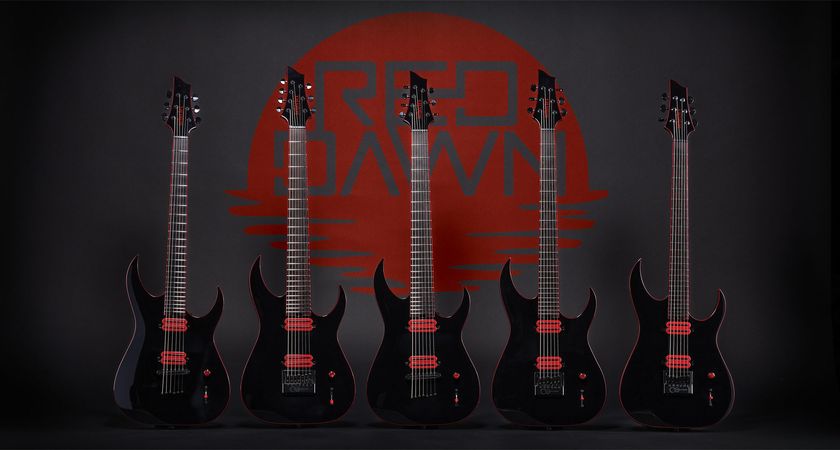Travis Barker: "I would love to do a jazz project. That would be so much fun."
Drummer talks pushing boundaries with Blink-182, studio sessions galore and following up his stunning solo album
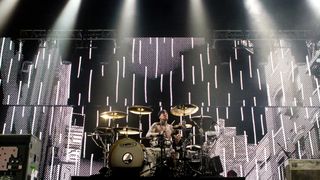
20 years of Travis
The opening words on Blink-182’s latest album, the Number One worldwide hit California, proclaim, ‘There’s a cynical feeling saying I should give up, you said everything you’ll ever say.’
If the record proves one thing, it’s that even almost 20 years into his Blink-182 career, Travis Barker is a long way from running out of things to say from behind his OCDP kit.
In fact, Travis began catching our attention with his wildly inventive beats even before he joined Blink thanks to the pure rock fury that he unleashed with cartoon punks The Aquabats.
From there, he was drafted into Blink in 1998, first as a stand-in live drummer faced with learning the band’s 20-song set in less than an hour. A flawless performance later and the seed was sown; later in the year Travis became Blink’s new full-time drummer.
While he had impressed with his ability to nail the live show, it was his work in the studio that quickly set Travis and Blink apart from the rest of the late ‘90s US pop punk scene. His debut recording with the band, the career-propelling, multi-million unit shifting Enema Of The State, is not your average pop punk record.
While Blink’s earlier material featured your standard fast and simple punk rock fare, here we could hear a drummer channelling a diverse catalogue of influences – from his marching background to his love of hip hop. Meanwhile, a song like Going Away To College managed to flitter between halftime snare grooves and a blistering flurry of accented singles with effortless ease.
And while that was all impressive enough, the array of projects filled with jaw-dropping beats that has flowed out of Travis in the 19 years since then is downright staggering.
Thanks to his frightening work ethic, Travis has formed side projects galore, recorded sessions with top names in rock, hip hop and pop and pieced together and recorded his own solo album. And when we caught up with him backstage earlier this year, we learned that he’s just getting started.
You see, an awful lot has happened in the two years since our last chat with the 41-year-old California native. For starters, he has recorded (but not yet released) an album with Antemasque and an EP with Transplants. He has also made a bunch of guest appearances and delved deep into sessions, as well as putting together his follow-up to 2011 solo record Give The Drummer Some.
The headline attraction of his recent work, however, is California, the seventh studio album for Blink, and the band’s first since Matt Skiba came in to replace Tom DeLonge.
The record is a reminder of Travis’s staggering creativity when it comes to writing drum parts. You’ll find half-time reggae feels (Los Angeles’), drum ‘n’ bass verses (‘Bored To Death’) and patterns so off-the-wall they could make producer John Feldman ask, ‘What the f*** was that?!’ (‘No Future’).
There’s even a foray into odd time found amongst the 12 bonus tracks on the just-released deluxe edition of California with ‘6/8’ experimenting with, well…6/8 timing, obviously. If all of that wasn’t impressive enough, when we catch that evening’s live show, we see that Travis loves to pepper his already impressive beats with on-the-fly fills, half-time sections and lightning-fast switches to open handed playing.
So as we sat with Travis on a barmy summer’s night in the West Midlands, we wanted to talk to him all about his insane creativity when it comes to writing beats, how he translates hip hop feels live and his never-ending array of studio sessions.
You recently put out the deluxe edition of California with 11 new songs, plus an acoustic re-working of Bored To Death. Were those tracks left over from the original sessions?
“The majority of them were left over from California. We had written I think 20 songs in about a month-and-a-half for California. Our label asked if we were interested in doing a deluxe album and we had these songs that were left over and we loved these songs a lot, so it was either they would come out on this deluxe album or they would come out two years from now on a new album. If you go for the latter then at that point the material sounds dated so we were really pushing for getting them out on the deluxe.
"A lot of people were like, ‘Misery? This is a single, what are you guys putting it on the deluxe for?’ But, despite how great a song it is in two years it will seem dated to us.”
Next year will be your 20th anniversary of joining Blink. How has your approach to writing beats changed in that time?
“Nothing has really changed. I always approached albums and writing drum parts in exactly the same way as I did in the beginning. If you listen to Enema…, my first recording with Blink, and then you listen to the new album, it is the same. I have always had my own sound.”
Were you given complete creative freedom with your drum parts right from the word go with Blink? Because the parts on Enema… are a world away from the beats on the band’s previous records
“I didn’t really know how it was going to work. No one ever got hold of me and said, ‘Hey, you’re going to be able to do this and you’re not going to be able to do this.’ It was just so quick and fast from filling in for a couple of shows to them telling me, ‘We think we want you to play drums with us.’
"Then I got a phone call two weeks later telling me that the next day was my first show. The whole ride was like that. Like, ‘Hey, we’re recording the album in two weeks.’ I just did what I thought I should do and what was expected of me. I didn’t really ask a lot of questions.
"Jerry Finn was around then and he was just such an amazing producer and person. Between Jerry, Tom and Mark they always gave me complete freedom with my drum parts. I think the way that Jerry said it back in the day was, ‘Hey, no one is doing guitar solos in this band, so in the bridges just do your thing Trav, be experimental.’
"Bridges were like my guitar solo but for drums. They weren’t necessarily drum solos but I could be creative and make the part different from the first and second verses and make the intros and outros different.”
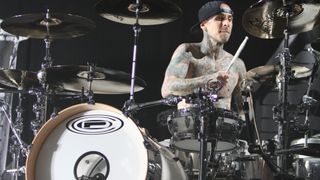
Writing beats
Is writing beats something that has always come naturally to you?
“I will always bounce my ideas off everybody. I might have three different ideas for a song, especially with California. Some songs were based around a drum part, sometimes they would have a guitar idea and I would say, ‘Let me go in and freestyle and you guys tell me which you love the most.’
"I would freestyle all the way, in all of the different ways that I could approach the verse, chorus or bridge. John [Feldman, California producer] would come to me and say, ‘Go really f***ed up or weird.’
"He would call it hip hop, but it’s not hip hop! It’s just not playing straight two-four or being experimental and playing a marching pattern or playing something with a weird offbeat or a mis-placed snare.”
You mentioned hip hop and marching just then, how much of an impact have those influences had on your work with Blink?
“They have both had a big influence. When it comes to fill ideas or even sticking patterns, just being able to lead with my left is important or being able to incorporate flams and stuff like that; all of that stuff I feel like has really helped me sound a little more like myself.
"That includes hip hop and every genre of music that I have played, from my stuff with Steve Aoki or my studio sessions with people like Lil Wayne or Playboi Carti, all of that shapes you as a drummer. I will learn something from every musical session that I do, I’m always learning.”
Through side projects and sessions you have played an array of styles. Are you able to bring all of those elements back to Blink?
“Yeah. Sometimes you can approach a song and I can play what everyone else would play or I tend to be more like, ‘Okay, how can I make this part more original?’ For example, the beginning of ‘No Future’.
"At first John just wanted a strong two and four on that song. I did it like that with just two and four and I thought it was kind of boring so I said, ‘What about this?’ I made that first part up on the fly and John was like, ‘What the f*** is that?! What is that?!’
"That is what makes Blink sound like Blink and not like other bands in our genre of music. I feel like having the freedom to have drum parts that are different and that are experimental is definitely fun and definitely makes it more exciting for me.”
Los Angeles is a drum part that caught our attention on California - how did that one come about?
“That one was this half-time reggae bass drop beat that I was messing with. I had this idea and luckily a great thing about Feldman doing the album is that he is very good with four on the floor and allowing reggae-feeling stuff because he comes from this ska background with his band [Goldfinger]. That was awesome.
"That beat was just experimenting; once I had heard the guitar part I had the idea to do that part at the beginning. The second verse goes to this four on the floor half-time kind of reggae, ska feeling thing.”
Teenage Satellite also has that reggae feel in places
“I love Teenage Satellite, that is one that I wish we were playing live. That one is a pretty straightforward beat. That was one where I said, ‘Okay, I can do this, this or this on the bridge.’ It has a reggae vibe half-time bridge.”
Given that you have worked on so many different projects, is it difficult to stay fresh with your beats? Do you ever suffer from writer’s block?
“I never have a loss of ideas in the studio. I think I probably have to give credit to being able to do so many different styles and doing so many different sessions at home. John Feldman moved less than a mile from me so every day he would call me up and be like, ‘Hey, I’m working on this Christmas album for this violinist, come over.’
"Or I will be like, ‘John, can I come use your studio? I’m recording the new Logic album, he just told me an hour ago and I’ve got to get it done before I leave for tour tomorrow.’
"I never know what is coming. I love having stuff thrown at me. For Logic, it was making an album that was Daft Punk meets James Brown and he wanted me to play drums on it. He asked when I was available and I said that I had to leave for tour the next day. He said, ‘Great, can we meet up in the next hour?’ We did and we knocked it out in like an hour.
"I feel that always juggling all of these projects keeps me fresh, keeps me on my toes and it keeps me versatile.”
Do you thrive on that pressure? We seem to recall that you landed the Blink gig at very short notice back in 1998…
“I think things are more fun like that. I’d rather that than having eight weeks to learn something. I like that pressure.”
“My first instrument was the drums. I am not a drummer like Travis is a drummer though by a long stretch. I was a decent drummer, I wasn’t great.
"Travis though is like he is from another planet. The guy is so talented. Because I started on drums I write with time signatures in mind so rhythm is huge to me and to play with Travis is a dream. It is so cool.
"We met years ago and I would watch Blink play and just watch Travis. I would think that if I ever played with that dude I wouldn’t be able to watch him because I would get too distracted.
"Like I would be thinking, ‘What the hell did you just do?!’ It has been a real blessing to play with Travis. He’s a great dude, a great father, a great friend and an incredible drummer.”
Coming onto your solo work, does that require a completely different creative mindset in comparison with Blink?
“It is mainly in terms of drum sounds. I try for the sake of Blink and Transplants and other rock stuff that I do, I try to make my solo project severely different to everything else that I do. It’s not something that I get to do a lot so when it comes to making a solo album there is a lot more to it than just playing drums. It is about producing and making the tracks first.
"That, I think, is the most challenging part for me. I feel like I have to make these tracks knowing that I’m going to play drums on the majority of them. That means that I know that they need to be high energy. Most of them have guitar and generally hip hop doesn’t have guitar.
"Hip hop generally doesn’t have live drums, although I think that is coming around right now. There’s an interesting movement about to happen with hip hop [and live drums].
"But the most challenging part of my solo work is me wearing my producer hat and figuring out what I want the track and the drums to sound like. That is especially difficult when I am in this world because Blink has been so busy.
"A lot of people go, ‘Oh, Travis Barker has a solo album, I hope he’s doing drum solos everywhere.’ Well, unfortunately not every song requires a drum solo. Even with Blink it's weird if I'm going crazy in every song. There comes a time with musicianship that you have to do what the song is asking for.
"It’s not always about, ‘Is Travis going crazy on this song?’ That is bad musicianship sometimes. So for my solo work, it is about finding that balance where I still find it fun and it is fun for fans who love the drums and love hip hop with live drums and a live musical element but so that it doesn’t hurt the song writing or make it sound out of place.”
Did you find that stepping into the production and solo project world taught you lessons in what works beat-wise that you were able to take back to Blink?
“For sure. It helps me with Blink records or when we’re placing 808s on Blink songs, all of that stuff. Even using electronic drum sounds, it all comes into play when we’re recording an album.”
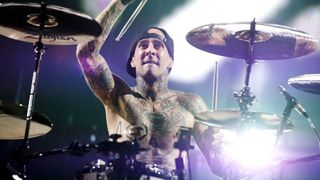
Changing up the beats
Do you have room for improvising your recorded parts live with Blink?
“I venture off a little bit. I will change intros into half-time and do new fills every day. I am always changing it. Mark always says to do it because it helps keep me fresh. Sometimes Matt will look back at me like, ‘What is going on?!’ I think keeping it fun and interesting is the way to go.
"Sometimes we will come off stage and say we like a part way better how I have just played it and we wish we had recorded it like that. It just keeps it fresh. I kind of get bored and I feel like when you see a live band I want to see that.
"If I had seen The Who I wouldn’t want to just see them play it like it was on the album, I would have wanted to have seen Keith Moon going f***ing crazy. Even if he had f***ed up, there has to be a reason why I am sitting there watching the band live rather than sitting at home listening to the album.”
Are you someone who gets inspiration from changing up the kit, whether it be changing a snare or adding a cymbal stack?
“At John’s studio where my kit was for this album, we would have five other bands in there the same week that we were recording so I would just leave the drumset there however it was [laughs]. It might not have even been my set-up but I find it fun to record on not exactly what [the kit] is supposed to be for me.
"I don’t think I change my set-up a whole bunch, I haven’t changed much over the years. I still play flat, my cymbals are high and flat and my snare is tilted away from me. That has never really changed.”
The last time we spoke to you, you mentioned that one day you would love to take a jazz gig. Is that still something you see in the future?
“When all's said and done I would love to do a jazz project. That would be so much fun. Or even now if I had time, but there hasn’t been a lot of time. I would love to do that, I just love playing anything.
"When I get off this tour I will just beg to do something different. I love switching it up. Even while I’m out here, I feel like Blink shows are a test of endurance, precision and power. Whereas I don’t always get to exercise, and I think it is like this for a lot of drummers, I don’t get to exercise a lot of the other chops that I have in every gig that I play."
When all's said and done I would love to do a jazz project. That would be so much fun
Beat-wise, is there crossover between jazz and hip hop?
“It depends who I am playing with. One of the last things that I did was with D.R.A.M, we did ‘Broccoli’. That was very musical and very pocket but he would still be like, ‘Hey Travis, go f***ing crazy.’
"That’s another thing when they tell me to go crazy but you’re saying, ‘Man, I don’t want to f*** up your song because it’s so rad.’ Sometimes on a hip hop track there will be very minimal programming, there might not even be any hi-hats.
"So I have to go into the situation and think how I can make my drum part tasteful. But he might be asking me to play it as Travis Barker and to go crazy, but the challenge for me is figuring out how I can do that while remaining tasteful.
"That was definitely more of a jazzy and kind of earthy gig but it was really fun and I got to go crazy at the end. It all depends on what [the artist] wants.”
How do you approach playing hip hop beats live? Particularly on a track that might just originally have a sampled beat?
“At first I will just learn everything the way that it was programmed. You never know what it is going to be like when you get in with a Musical Director and there might be a band.
"They might say that on the last section of the second verse they are going to do it totally different. So I will learn everything exactly as it is on the record and then I will go in and also play times where I am just playing fills over the entire track so I can just figure out my comfort zone and work out what is natural to me.
"That way when I go up there on stage I’m not thinking a whole bunch. The most important thing to do is to listen to the MD and the artist and what they want.”
What is the state of play on your new solo album?
“I am 70 percent done with my new solo album. The next part, the most important piece, is for me to go play drums on it now. We’ve got the programming, I’ve made all of the beats, the second step was to get all of the artists and find out which artists sound great on which beats. The third step is me playing drums on it, mixing it and then putting it out.”

Sessions galore
Can you share details of any of the guests on the record?
“I can mention some of the guests. I have Lil Wayne, Young Jeezy, Run The Jewels, Wiz Khalifa, Kendrick, Jay 305, YG, Anderson Paak, The Game, Problem…I have a lot of guests! I have a lot and I am still writing right now.”
Tell us about the process of putting a solo album together. Do you write with somebody in mind? Is there a lot of sending files over email?
“It just depends. With Run The Jewels, I have done so many collaborations with them in the past that they always said they would love to do something on one of my solo projects. [Run The Jewels’] Mike was in town and I played him some beats and he said, ‘That is the beat.’ I love it when that happens.
"Otherwise, you never know. It’s like you giving me ideas for a Blink album and you base it off what the last material that we put out was. You can’t really do that because you don’t know where my head is at now. It’s really fishing around for me thinking where Kendrick’s head is at right now and what is he excited about?
"It’s me thinking about what Killer Mike and El-P are excited about. What is Wiz Khalifa excited about? It’s about that and not just making something for them like the material everybody has already heard them on.”
What else do you have on the way?
“There’s a Transplant record called Take Cover coming out 13 October and there is an Antemasque album with Omar and Cedric from Mars Volta and At The Drive-In coming. That one has been recorded for two years. I think they want to let At The Drive-In tour and put out their album and then they will drop the Antemasque album. We’ve filmed a video for it and everything already.”
I just try to keep it hellish. I have to. If I am just practising jazz chops or if I am practising just on one pad, maybe some marching rudiments – no. I feel like my body has to be moving.
When did you find time to fit in recording with Transplants?
“It was recorded over a year and a half ago. It is hard to balance the projects that I do that have members who are in other bands. A lot of it is, ‘Okay, well this can’t drop before the Blink album.’ And then we’ll be about to drop it and they’ll say, ‘Well, Rancid is about to drop, so you can’t drop it there,’ or, ‘At The Drive-In is about to drop, you can’t drop it there.’ It is about paying respect to everyone’s main bands and then rolling the side projects out.”
With so many projects and last-minute studio calls you need to keep your chops up. Is that difficult while you’re on tour? Do you have a set practice routine while you’re out on the road?
“I wish I had a kit with me on tour to practise on. Usually I will just practise in my hotel room. But if I have more than one day off then on the second day I will be playing on a practice pad for an hour. It is just about keeping my body moving.
"I take a boat home that takes nine days, and I play a show with Blink in London and then the next morning I dock on the boat and leave. When I dock in New York I have a show that night. I will play for at least two hours a day every day on the boat.”
If you had a day off for practising what could we expect to find you working on?
“I just try to keep it hellish. I have to. If I am just practising jazz chops or if I am practising just on one pad, maybe some marching rudiments - no. I feel like my body has to be moving. With the Blink set it is this endurance test so I have to keep on moving.”
As we mentioned earlier you are almost 20 years in with Blink - do you have any favourite drum tracks or moments from that time?
“I feel like Feeling This was really cool, it still is really cool. That is a song that is interesting for drummers as well. Bored To Death and Los Angeles are fun songs for drummers as well from the new album.
"No Future as well, if you play the intro right then that one can be fun, the groove that happens in Kings Of The Weekend is super original as well so that one is a lot of fun.
"Further back, Stockholm Syndrome is really cool and Down is a really weird one with a lot of weird fills that I love but that I can’t believe Jerry let me play [laughs].”
Any there any tracks that have evolved and that you now play live completely differently to how they were recorded?
“The guts have to stay the same. But the fills and stuff can change. Like on Dumpweed I will just play whatever I am feeling that night. The fill could be two measures long, two beats long or whatever.
"I Miss You is entirely different live now to how it was recorded. The ending of that song has a whole drum outro. Down has a drum outro as well that I change every night based on how I am feeling.”
Throughout all of your work you have developed your own unmistakable style. What is the key to finding your own voice on the kit and in your beat writing?
“I kind of mention it in my book, it is one thing to sit there and learn a drummer’s parts, but it is a whole other thing to be the one that is credited with writing those parts.
"This is a whole area of drumming that is very important to drummers. It is creating your own sound and writing interesting drum parts. I think that is the challenge. And then writing drum parts that you can actually pull off live.
"It is one thing to do all of this crazy stuff in the studio but if you can’t nail it night after night then it is pointless. I just think that you can get to those places by listening to everything, by playing everything and by challenging yourself. There are times when I sit and practise stuff that I am good at, but I usually go right for the things that give me trouble.
"It’s like working out, you can sit there and do biceps all day but no one wants to do jump squats or whatever is giving them trouble whereas that is what you should migrate to; go to the stuff that gives you trouble. When you do that I feel like it opens up doors in your playing and it gives you a lot more freedom.”

Rich is a teacher, one time Rhythm staff writer and experienced freelance journalist who has interviewed countless revered musicians, engineers, producers and stars for the our world-leading music making portfolio, including such titles as Rhythm, Total Guitar, Guitarist, Guitar World, and MusicRadar. His victims include such luminaries as Ice T, Mark Guilani and Jamie Oliver (the drumming one).
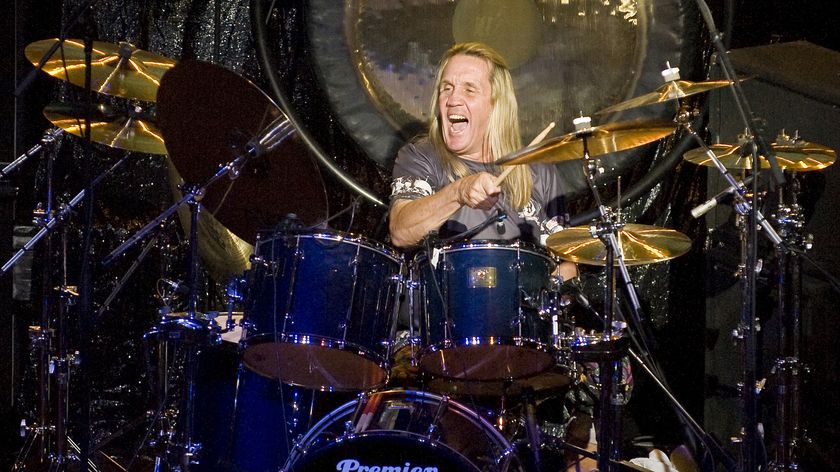
“Sometimes I can do the big drum fill in the intro to The Trooper. But even then it's a bit flaky, it’s not clean”: Iron Maiden legend Nicko McBrain’s “difficult decision” to retire from touring
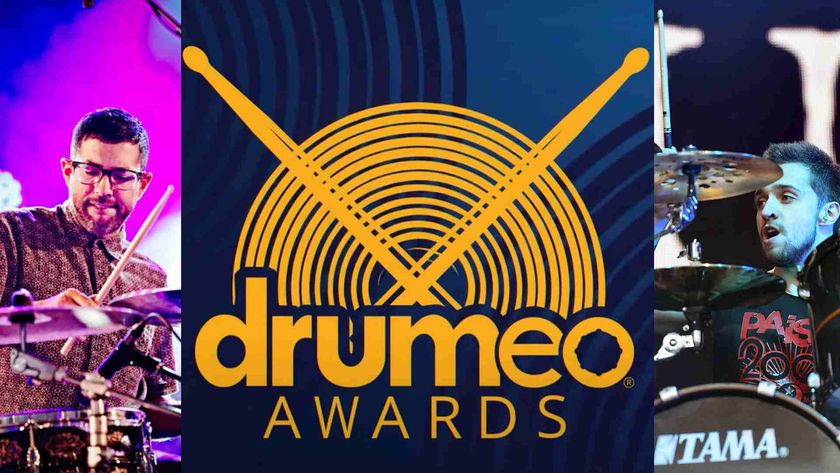
Here are all the winners in the 2024 Drumeo Awards. Did your favourite sticksmith make the cut?

“Sometimes I can do the big drum fill in the intro to The Trooper. But even then it's a bit flaky, it’s not clean”: Iron Maiden legend Nicko McBrain’s “difficult decision” to retire from touring

Here are all the winners in the 2024 Drumeo Awards. Did your favourite sticksmith make the cut?
Most Popular









